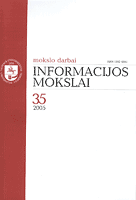Žinių visuomenės vadybinio racionalizavimo principai
New criteria of rationality in knowledge society
Author(s): Arūnas AugustinaitisSubject(s): Economy
Published by: Vilniaus Universiteto Leidykla
Summary/Abstract: The main purpose of this article is to examine the radically changing logic of decision-making and its traits in the knowledge society environment. Along with the changes in the traditional societal structure, a new paradigm of decision-making forms influenced by the complex processes of essentially is developing. The paradigm is based on the other principles of rationality, which are dominated by information ontology or constructed accordingly to the information rules of contemporary world. These new patterns of rationality are disparate from the customary decisionmaking models that are based on the classical attitudes derived from natural sciences. Most of objects, which where not covered by the traditional approaches and attributed or nominated as irrationality, for example, values, culture, experience, personalization, intuition, etc., are obtaining a rank of practical instruments for the today’s global and multi-societal development of society. Knowledge society and knowledge economy demand not only increasingly growing improvements of information processes only, but new efficient methods of giving a sense of them as well. The methods suppose an involvement of irrational and even mystic elements in to contemporary models of practice in terms of management and decision-making. This article is devoted to analyse the distinctions between systemic and informational paradigms of rationality. It does not investigate the meaning of irrationality or mysticism in general, or even their relationships within contemporary science’s constellation. The main criterion is how the irrational elements are more often included into social and economic relations as an organic part and what kind of impact they do on the state-of-the- art of organizational practices and transform the decision-making having in mind the adaptability of irrational dimension to the traditional models of organization. In the broadest sense there are managerial criteria, which allow us to analyse the irrationality in the practical terms. The different spheres of irrationality are integrated into traditional systems of rationality that create presumptions for seeking substantial intersections of those different branches of knowledge. Managerial approach diminishes or even excludes the possibilities for scientific speculations as economic criteria integrate irrational elements and real practice directly. So far as irrationality is incorporated into practical relationships, it becomes a subject of scientific analysis. Managerial approach is tightly related with the issues of changing decision-making model in knowledge society and definition of its new paradigm. The article describes the criteria of rationality emerging in the knowledge society, the way they conform to the main societal development tendencies as well as the methodological specificities of new mechanisms of contemporary decision-making.
Journal: Informacijos mokslai
- Issue Year: 2005
- Issue No: 35
- Page Range: 32-46
- Page Count: 15
- Language: Lithuanian

